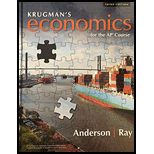
The similarities, differences between credit union and bank and how a person can choose one over the other.
Explanation of Solution
Similarities between banks and credit unions are as follows:
- Both banks and credit unions provide checking, saving, and
money market accounts to their customers as they both offer direct deposit, internet banking, debit cards, credit cards as well as overdraft protection. - These both institution offers home loans, auto loans, and small-business loans.
- They both offer insurance coverage up to $250,000 as banks provide through the Federal Deposit Insurance Corporation for banks and credit unions through the National Credit Union Administration for credit unions.
Differences between banks and credit unions are as follows:
- The aim of bank is to generate profits and banks also pay tax on the profits but credit unions but the aim of credit union is to serve their members such as providing dividends to members. Banks charge higher interest rate but credit union charges lower interest rate on borrowings. Banks pay taxes but credit unions are exempted from federal tax.
- Banks are open for every customer who does not have history of banking problems but credit union involves cooperative members only such as members who share common bond.
- Members of credit union are provided with most personalized services but banks do not deal with personalized services for their customers.
A person can choose credit union over bank when he/she needs more personalized services but if he/she needs modern services such as advanced internet or mobile banking then they can prefer banks over trade unions.
But to choose one over the other, a person needs to compare fees, minimum deposits requirement, interest rate, reputation of institutions, and what is more important for them so that they can avail best services.
Introduction: Financial institutions such as banks, credit unions, etc. are the institutions that provide financing services to individual and corporations by offering loans, deposit services, etc.
Chapter P1 Solutions
Krugman's Economics For The Ap® Course

 Principles of Economics (12th Edition)EconomicsISBN:9780134078779Author:Karl E. Case, Ray C. Fair, Sharon E. OsterPublisher:PEARSON
Principles of Economics (12th Edition)EconomicsISBN:9780134078779Author:Karl E. Case, Ray C. Fair, Sharon E. OsterPublisher:PEARSON Engineering Economy (17th Edition)EconomicsISBN:9780134870069Author:William G. Sullivan, Elin M. Wicks, C. Patrick KoellingPublisher:PEARSON
Engineering Economy (17th Edition)EconomicsISBN:9780134870069Author:William G. Sullivan, Elin M. Wicks, C. Patrick KoellingPublisher:PEARSON Principles of Economics (MindTap Course List)EconomicsISBN:9781305585126Author:N. Gregory MankiwPublisher:Cengage Learning
Principles of Economics (MindTap Course List)EconomicsISBN:9781305585126Author:N. Gregory MankiwPublisher:Cengage Learning Managerial Economics: A Problem Solving ApproachEconomicsISBN:9781337106665Author:Luke M. Froeb, Brian T. McCann, Michael R. Ward, Mike ShorPublisher:Cengage Learning
Managerial Economics: A Problem Solving ApproachEconomicsISBN:9781337106665Author:Luke M. Froeb, Brian T. McCann, Michael R. Ward, Mike ShorPublisher:Cengage Learning Managerial Economics & Business Strategy (Mcgraw-...EconomicsISBN:9781259290619Author:Michael Baye, Jeff PrincePublisher:McGraw-Hill Education
Managerial Economics & Business Strategy (Mcgraw-...EconomicsISBN:9781259290619Author:Michael Baye, Jeff PrincePublisher:McGraw-Hill Education





